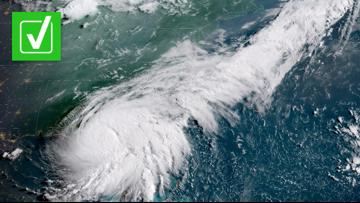The United Nations’ Intergovernmental Panel on Climate Change (IPCC) released a report on Aug. 9, concluding humans have unequivocally influenced global warming through the emission of greenhouse gases. The report also said the scale of recent warming is unprecedented and could have extreme consequences for future generations.
After the report’s release, two congressmen, Rep. Joe Neguse and Rep. Mondaire Jones, claimed the report said climate change had already caused irreversible damage.
THE QUESTION
Did the U.N. report say climate change has already caused irreversible damage?
THE SOURCES
- U.N. IPCC sixth assessment report
- NASA
- Petteri Taalas, secretary-general of World Meteorological Organization
- Scott Sklar, professor at George Washington University
- Valerie Masson-Delmotte, co-chair of the group that produced the IPCC report
- Rick Spinrad, NOAA administrator
THE ANSWER
Yes, the U.N. report said climate change, driven by greenhouse gas pollution, has already caused some irreversible damage that will impact the earth for hundreds of years. But it also concluded that future warming and the worst projected effects can still be limited with the rapid reduction of emissions.
WHAT WE FOUND
The IPCC was established in 1988 to provide governments with climate information that could be used to guide policy decisions. The latest report published on Aug. 9 is the sixth assessment report completed by the IPCC since its inception. It was authored by more than 200 scientists from across the world and drew from 14,000 scientific publications.
The report says some impacts of climate change, such as warming oceans and rising sea levels, are already irreversible for at least hundreds of years -- meaning those changes are not expected to revert for that period of time even if net-zero emissions were achieved today.
“Many changes due to past and future greenhouse gas emissions are irreversible for centuries to millennia, especially changes in the ocean, ice sheets and global sea level,” the report says.
The report specifically references global ocean temperature, deep ocean acidification and deoxygenation as changes that “are irreversible on centennial to millennial time scales.”
The secretary-general of the World Meteorological Organization, in response to the report, said “some of the negative changes are already locked into the climate system.”
On NASA’s website, the agency says the impacts of human-induced climate change are irreversible in our lifetimes.
Scott Sklar, a sustainable energy professor at George Washington University, said this IPCC report was more blunt than previous reports about humans driving climate change and potential repercussions.
“It's now ringing a bell, saying, we thought these things were going to happen, now we've measured them and they are going to happen,” Sklar said of the report. “And this is the extent of what we're going to have. And we're going to have higher heat waves, and much deeper, colder cold waves, and more intense hurricanes and monsoons and more flooding and more forest fires.”
The report concluded human influence has warmed the climate at a rate not seen in at least 2,000 years. The planet has warmed 1.1°C since 1850-1900 -- the preindustrial era. The report attributes that increase to greenhouse gas emissions from human activities.
To project how much warmer the planet could get in the future, the report utilized models depicting five scenarios based on different levels of greenhouse gas emissions. In each scenario, global warming over the next 20 years reached or exceeded 1.5°C above the 1850-1900 baseline, according to Valerie Masson-Delmotte, the co-chair of the group that produced the IPCC report.
The 1.5°C benchmark is notable because that’s the targeted warming limit goal set by the Paris Agreement -- an international treaty on climate change.
And although models suggest the planet will warm beyond the intended limit of the Paris Agreement, Masson-Delmotte said humans could still limit warming.
“If emissions are reduced rapidly and if at the global scale they reach net zero by around 2050, then the temperature would be very close to 1.5°C by the middle of the century and would decline lower to that level by the end of the century,” she said in a press conference following the release of the report.
The Biden administration says the U.S.’s goal is to reach net-zero emissions by 2050. According to the International Energy Agency, the U.S. was the second-biggest emitter of carbon dioxide in 2018, the most recent year with available data. China was the largest emitter. The IPCC report says carbon dioxide concentration is at its highest point in at least 2 million years.
NASA, the heads of the National Oceanic and Atmospheric Administration and the World Meteorological Organization, and George Washington University professor Sklar said there must be a significant and quick reduction in greenhouse gas emissions to limit future warming and its potential impacts.
"What the report did say is, while we're at a precipice, we're not at the end of the line yet,” Sklar said.
More from VERIFY: Yes, wildfires can create their own storms












